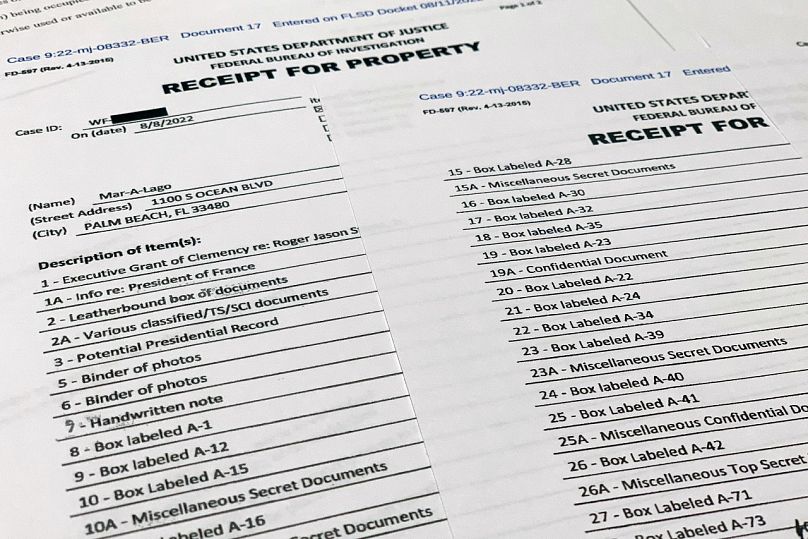Court papers reveal the FBI seized records include some marked as classified and "top secret", while the Justice Department says it has reason to believe Trump violated the Espionage Act.
The FBI recovered documents that were labelled "top secret" from former President Donald Trump’s Mar-a-Lago estate in Florida, according to court papers released on Friday.
The US Justice Department confirmed the seizure on Friday while also disclosing it has probable cause to believe that Trump violated the Espionage Act, a federal law that prohibits the possession or transmission of national defence information.
The latest bombshell disclosures came after a federal judge unsealed the warrant that authorised the unprecedented search this week.
A property receipt — a document prepared by federal agents to specify what was taken during a search — unsealed by the court shows FBI agents took 11 sets of classified records from the estate during a search on Monday.
The seized records include some that were marked as classified and "top secret" — the highest level of classification, reserved for the country's most closely held national security information.
FBI agents took more than 30 items including more than 20 boxes, binders of photos, a handwritten note and the executive grant of clemency for Trump's ally and longtime adviser Roger Stone, a list of items removed from the property showed. Also included in the list was information about the "President of France".
In a statement on Friday, Trump claimed that the documents seized by agents at his Florida club were “all declassified,” and argued that he would have turned over the documents to the Justice Department if asked.
While incumbent presidents have the power to declassify information, that authority lapses as soon as they leave office and it was not clear if the documents in question have ever been declassified.
Trump also kept possession of the documents despite multiple requests from agencies, including the National Archives, to turn over presidential records in accordance with federal law.
US Magistrate Judge Bruce Reinhart — the same judge who signed off on the search warrant — unsealed the warrant and property receipt Friday at the request of the Justice Department.
It came after Attorney General Merrick Garland declared there was “substantial public interest in this matter,” and Trump backed the warrant’s “immediate” release. The Justice Department told the judge on Friday afternoon that Trump’s lawyers did not object to the proposal to make it public.
In messages posted on his Truth Social platform, Trump wrote, “Not only will I not oppose the release of documents ... I am going a step further by ENCOURAGING the immediate release of those documents.”
Trump himself has been given at least some of the records the government was seeking to unseal, but he and his lawyers have declined, so far, to make them public.
The Justice Department's request is striking because such documents traditionally remain sealed during a pending investigation.
But the department appeared to recognise that its silence since the search had created a vacuum for bitter verbal attacks by Trump and his allies, and that the public was entitled to the FBI’s side about what prompted Monday’s action at the former president’s home.
“The public’s clear and powerful interest in understanding what occurred under these circumstances weighs heavily in favor of unsealing,” said a motion filed in federal court in Florida on Thursday.
The documents could disclose unflattering information about Trump and about FBI scrutiny of his handling of sensitive government documents right as he prepares for another run for the White House.
To obtain a search warrant, federal authorities must prove to a judge that probable cause exists to believe that a crime was committed. Garland said he personally approved the warrant.
Neither Trump nor the FBI has said anything about what documents the FBI might have recovered, or what precisely agents were looking for.
The Mar-a-Lago search warrant served Monday was part of an ongoing Justice Department investigation into the discovery of classified White House records recovered from Trump's home in Palm Beach, Florida, earlier this year.












